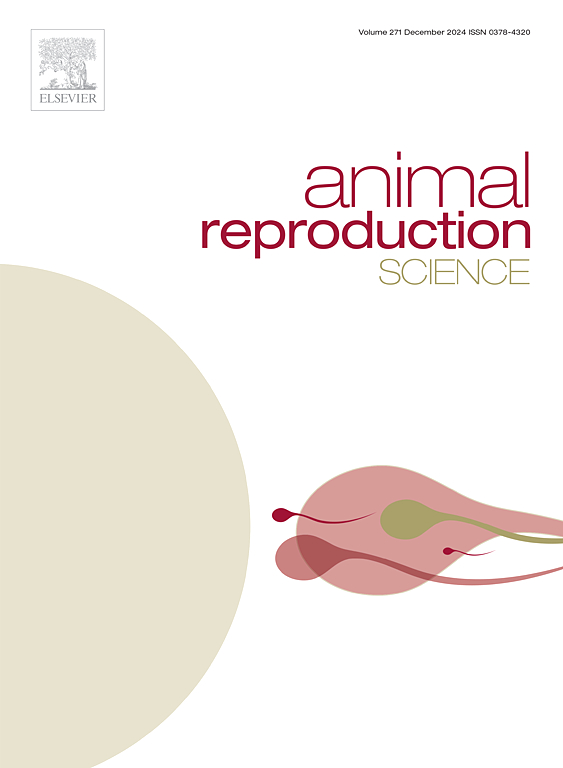Differential impact of the kinase inhibitors ruxolitinib and ceritinib on porcine sperm in vitro
IF 2.2
2区 农林科学
Q1 AGRICULTURE, DAIRY & ANIMAL SCIENCE
引用次数: 0
Abstract
Small-molecule protein kinase inhibitors are applied for the medical treatment of several diseases (Roskoski Jr, 2016). Given the increasing use of these molecules, particularly in cancer therapy, their influence on sperm is of great importance for a better understanding of the presumed effects on the reproductive potential and fertility of male patients. Therefore, we investigated the influence of the small-molecule kinase inhibitors ruxolitinib and ceritinib on porcine sperm in vitro. Porcine sperm were employed as a substitute for mammalian, especially human sperm, as they are available in large quantities in reproducible quality. Under all conditions, ceritinib at a molar drug/lipid ratio of 1:10 had adverse effects on sperm motility, viability and membrane integrity, while ruxolitinib at highest concentrations showed no or only weak effects on motility parameters. The massive merocyanine 540 binding in all dead and most viable ceritinib treated cells already after a short-term incubation at 38°C qualifies the disturbance of membrane lipid order as the most likely cause for the observed decrease in motility and viability. Therefore, possible damage to human sperm must be considered when administering ceritinib. The attempt to investigate a kinase-mediated influence of the inhibitors on capacitation and acrosome reaction failed because even the low concentration of the solvent DMSO interfered with this function. To test effects of small-molecule kinase inhibitor on selected properties of living cells, porcine sperm has proven to be a useful in vitro model.
激酶抑制剂ruxolitinib和ceritinib对体外猪精子的不同影响
小分子蛋白激酶抑制剂应用于多种疾病的医学治疗(Roskoski Jr, 2016)。鉴于这些分子的使用越来越多,特别是在癌症治疗中,它们对精子的影响对于更好地理解对男性患者生殖潜力和生育能力的假定影响具有重要意义。因此,我们在体外研究了小分子激酶抑制剂ruxolitinib和ceritinib对猪精子的影响。猪精子被用作哺乳动物,特别是人类精子的替代品,因为它们具有大量可重复的质量。在所有条件下,塞瑞替尼在药脂比为1:10时对精子活力、活力和膜完整性有不利影响,而最高浓度的鲁索利替尼对精子活力参数没有或只有微弱影响。在38°C的短期孵育后,所有死亡和最具活力的ceritinib处理过的细胞中大量的merocyanine 540结合证明了膜脂秩序的紊乱是观察到的活力和活力下降的最可能原因。因此,在给药时必须考虑对人类精子可能造成的损害。研究激酶介导的抑制剂对能化和顶体反应的影响的尝试失败了,因为即使是低浓度的溶剂DMSO也干扰了这种功能。为了测试小分子激酶抑制剂对活细胞某些特性的影响,猪精子已被证明是一种有用的体外模型。
本文章由计算机程序翻译,如有差异,请以英文原文为准。
求助全文
约1分钟内获得全文
求助全文
来源期刊

Animal Reproduction Science
农林科学-奶制品与动物科学
CiteScore
4.50
自引率
9.10%
发文量
136
审稿时长
54 days
期刊介绍:
Animal Reproduction Science publishes results from studies relating to reproduction and fertility in animals. This includes both fundamental research and applied studies, including management practices that increase our understanding of the biology and manipulation of reproduction. Manuscripts should go into depth in the mechanisms involved in the research reported, rather than a give a mere description of findings. The focus is on animals that are useful to humans including food- and fibre-producing; companion/recreational; captive; and endangered species including zoo animals, but excluding laboratory animals unless the results of the study provide new information that impacts the basic understanding of the biology or manipulation of reproduction.
The journal''s scope includes the study of reproductive physiology and endocrinology, reproductive cycles, natural and artificial control of reproduction, preservation and use of gametes and embryos, pregnancy and parturition, infertility and sterility, diagnostic and therapeutic techniques.
The Editorial Board of Animal Reproduction Science has decided not to publish papers in which there is an exclusive examination of the in vitro development of oocytes and embryos; however, there will be consideration of papers that include in vitro studies where the source of the oocytes and/or development of the embryos beyond the blastocyst stage is part of the experimental design.
 求助内容:
求助内容: 应助结果提醒方式:
应助结果提醒方式:


